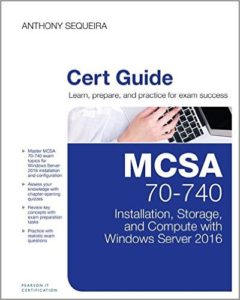
Here is an excerpt on ReFS from my book – MCSA 70-740 Cert Guide: Installation, Storage, and Compute with Windows Server 2016 (Certification Guide) 1st Edition
ReFS Overview
It is interesting that NTFS is no longer the only realistic option for file formats. Microsoft now provides a new and improved version 2 of the Resilient File System (ReFS). ReFS first appeared in Windows Server 2012. Microsoft certainly had sights initially on this file system becoming the next generation of their file system. Let us examine the current advantages and disadvantages in detail. One or more of these fine points is very likely to rear its head in a Certification Exam environment.
ReFS Advantages
ReFS has some distinct advantages over NTFS that you should be aware of:
- ReFS gives Accelerated VHDX options in Hyper-V; these options permit massive performance increases when creating and extending a virtual hard disk, when merging checkpoints, and when performing backups.
- A block cloning approach is key to excellent checkpoint performance.
- Use of a 64 KB block size allows optimal performance in Hyper-V, with partition alignment handled automatically by Hyper-V.
- When your Storage Spaces pool uses ReFS as the underlying on-disk format, it leverages new features to greatly improve the repair process.
- ReFS v2 uses the concept of cluster “bands” to group multiple chunks of data together for efficient I/O; this really helps with your use of data tiering[md]specifically in moving data between tiers.
- Automatic integrity checking exists in ReFS.
- ReFS features new data scrubbing techniques.
- ReFS offers better protection against data degradation.
- It features built-in drive recovery and redundancy.
- ReFS supports up to 1 trillion terabytes.
- You can create new volumes faster with ReFS.
ReFS Disadvantages
There are also some disadvantages to ReFS that you should be aware of:
- It cannot replace NTFS in all scenarios.
- You cannot use it with Clustered Shared Volumes.
- There is no conversion capability between NTFS and ReFS.
- There is no file-based deduplication.
- There are no disk quotas.
- There are no object identifiers.
- There is no encryption support.
- You cannot use named streams.
- There is no transaction support.
- There are no hard links.
- There is no support for external attributes.
- There is no support for 8.3 filenames.